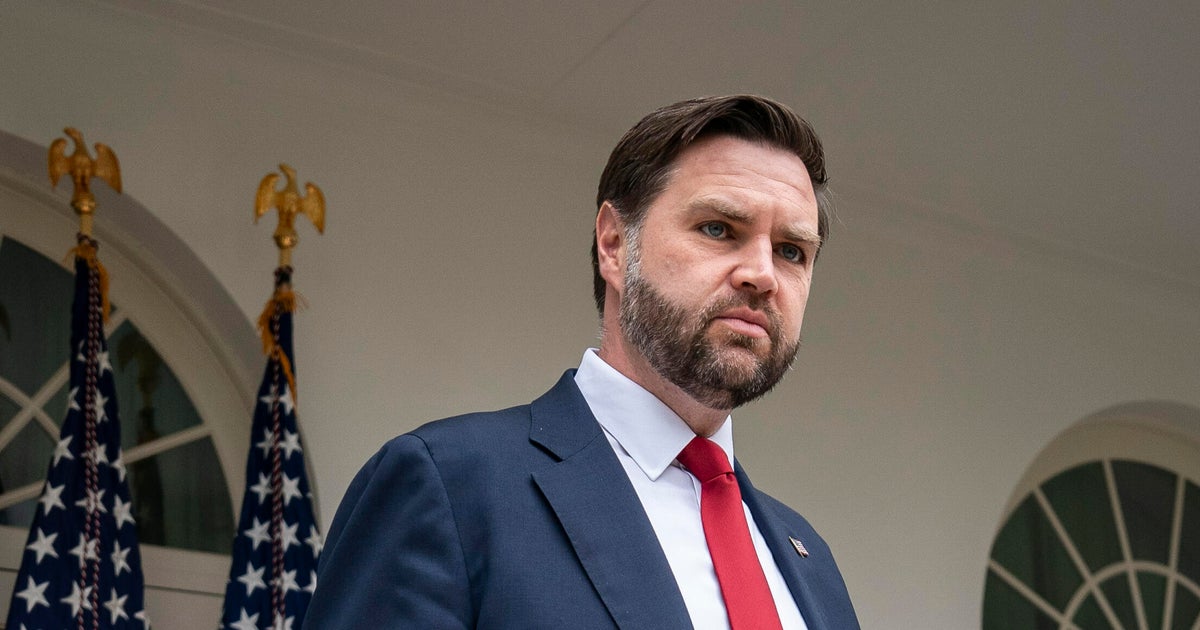London — “I love European people,” Vice President JD Vance said in interview with a U.K.-based news website this week, laying out his thinking on a number of issues related to U.S.-European ties. While the American vice president stressed historic cultural links between the U.S. and Europe, he doubled down on the Trump administration’s stance that the continent must step up to protect itself in the face of new threats, and not take protection for granted as a “security vassal” of the United States.
The interview with the UnHerd news website covered the topics of security, tariffs and trade, and the war in Ukraine, according to the outlet’s own report on its interview with Vance. Below is a look at some of the key remarks from the vice president on those topics.
“I’ve said repeatedly that I think that you can’t separate American culture from European culture. We’re very much a product of philosophies, theologies, and of course the migration patterns that came out of Europe that launched the United States of America,” Vance was quoted as telling UnHerd.
UnHerd was founded by billionaire hedge fund manager Paul Marshall, who also owns the British right-of-center commentary magazine, The Spectator, and co-owns GB News, which has been positioning itself as a U.K. equivalent to Fox News.
“It’s not good for Europe to be the permanent security vassal of the United States,” Vance told the outlet, adding that he believes Europe’s increased independence from the U.S. in terms of security would be positive for the U.S., too, citing the invasion of Iraq as an example of how a more assertive partner could have benefited Washington.
“Something I know a little bit more personally: I think a lot of European nations were right about our invasion of Iraq,” said Vance, who served as a U.S. Marine for four years, including a stint as a news reporter for the military in Iraq. “Frankly, if the Europeans had been a little more independent, and a little more willing to stand up, then maybe we could have saved the entire world from the strategic disaster that was the American-led invasion of Iraq.”
Vance also reiterated frequent criticism from the Trump administration over the current military capacities of European countries.
“The reality is — it’s blunt to say it, but it’s also true — that Europe’s entire security infrastructure, for my entire life, has been subsidized by the United States of America,” Vance said. “Most European nations don’t have militaries that can provide for their reasonable defense.”
Vance, who berated Ukrainian President Volodymyr Zelenskyy alongside President Trump in an explosive meeting at the White House earlier this year, rejected accusations that the Trump administration has supported Russian narratives about the war Vladimir Putin launched more than three years ago.
“I think it’s sort of absurd for Zelenskyy to tell the [American] government, which is currently keeping his entire government and war effort together, that we are somehow on the side of the Russians,” Vance said.
Vance told UnHerd he had “tried to apply strategic recognition that if you want to end the conflict, you have to try to understand where both the Russians and the Ukrainians see their strategic objectives. That doesn’t mean you morally support the Russian cause, or that you support the full-scale invasion, but you do have to try to understand what are their strategic red lines, in the same way that you have to try to understand what the Ukrainians are trying to get out of the conflict.”
Vance said, according to UnHerd, that in the long term, “what we want to see is lower trade deficits, really across the board.”
“Sometimes, a trade deficit makes sense,” Vance said. “Like, America doesn’t produce bananas. So obviously, we’re gonna be importing bananas, not exporting bananas. So with certain product categories and maybe even with some countries, a small trading deficit can be justified.”
But in general, Vance said “what the global trading system has led to is large and persistent trade deficits across product categories, with the gross majority of countries really using the United States to absorb their surplus exports. That’s been bad for us. It’s been bad for American manufacturers. It’s been bad for workers. And God forbid, if America ever fought a future war, it would be bad for America’s troops.”
Mr. Trump’s tariffs caused large drops in global stock markets, and while some of those losses have been recovered, analysts warn the trade war will keep the markets volatile. Vance acknowledged that tumult, but reiterated the White House’s stance that some disruption is a necessary cost of fundamentally changing the global system of trade.
“Any implementation of a new system is fundamentally going to make financial markets jittery,” he told UnHerd. “The President has been very consistent that this is a long-term play.”
But the vice president also hinted at flexibility that Mr. Trump and his close aids did not initially indicate would be feasible when the steep tariffs were announced.
“Of course, you have to be responsive to what the business community is telling you, what workers are telling you, what bond markets are telling you. These are all variables that we have to be responsive to,” he said, to “make the policy successful.”
Speaking specifically about the U.K., Vance said the U.S. was working to reach a trade deal with its long-time close ally, and speculated that there was “a good chance” it could happen.
“We’re certainly working very hard with Keir Starmer’s government,” Vance told UnHerd. “The president really loves the United Kingdom. He loved the queen. He admires and loves the king. It is a very important relationship. And he’s a businessman and has a number of important business relationships in [the U.K.]. But I think it’s much deeper than that. There’s a real cultural affinity and, of course, fundamentally America is an Anglo country.”
He said other European countries had more of a trade deficit with the U.S., so reaching a deal with the European Union or its 27 member states could be harder.
“With the United Kingdom, we have a much more reciprocal relationship than we have with, say, Germany,” Vance said. “While we love the Germans, they are heavily dependent on exporting to the United States but are pretty tough on a lot of American businesses that would like to export into Germany.”




